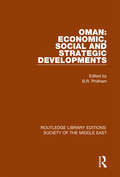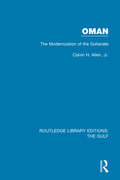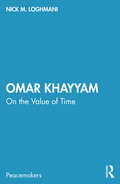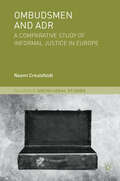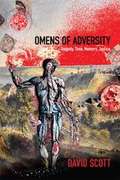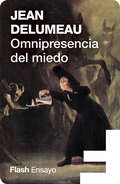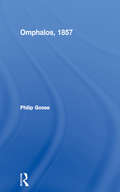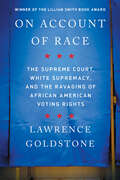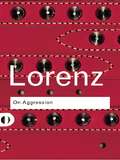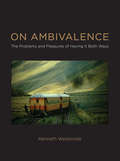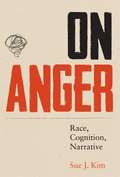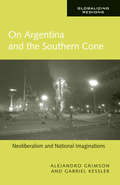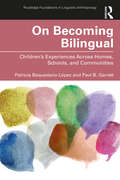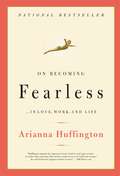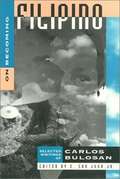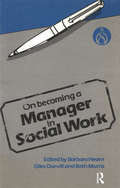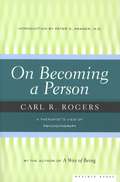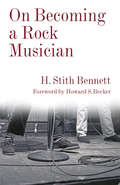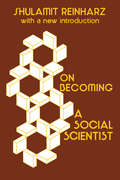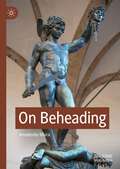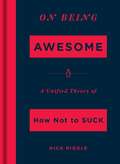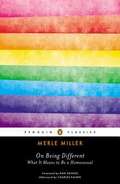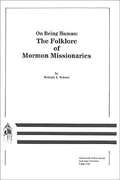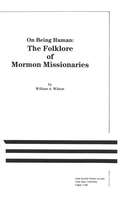- Table View
- List View
Oman: Economic, Social and Strategic Developments (Routledge Library Editions: Society Of The Middle East Ser.)
by B. R. PridhamOman is an important country for the West, both as an oil exporter and as a key ally strategically placed at the entrance to the Gulf. This book, first published in 1987, provides an overview of post-war social, political and economic developments in the country. It outlines the historical and geographical background, considers economic developments both in the oil and non-oil sectors, as well as exploring societal changes in Omani culture and education.
Oman: The Modernization Of The Sultanate (Routledge Library Editions: The Gulf)
by Calvin H. Allen, JrUntil the 1970s Oman was an isolated, almost medieval kingdom, virtually unknown to the outside world. The 1970 palace coup that brought Sultan Qaboos b. Sa’id Al-Sa’id to power also brought Oman into the twentieth century. Development programmes made modernization a rapid process, and Oman’s location at the entrance to the Straits of Hormuz gave the country an increasing importance to US security interests in the Gulf region. Yet despite modernization, Oman remains an unknown land. This book, first published in 1987, dispels some of the mystery by focusing on the land, the people and the history. It explores the influences on events of trade, foreign involvement in Omani affairs, and Ibadism (the principal sect of Islam in Oman). It also emphasizes the role of the Sultan in contemporary Oman. The architect of Oman’s ‘new age’, Qaboos has overseen significant changes in the country’s political system and rapid economic growth financed by oil exports.
Omar Khayyam: On the Value of Time (Peacemakers)
by Nick M. LoghmaniThis book explores the life and work of Omar Khayyam as a provocateur of peace. While Khayyam is known for his poetry, he was foremost a prominent mathematician who looked at the world from a unique perspective. Using the transformative power of mathematics, he brought together seemingly irreconcilable concepts in his work. Through his art, philosophy, and mathematics, Khayyam sought to create harmony between what on the surface looks like a clash between his scientific view, romantic and often provocative poetry, and philosophy. The book sheds light on his spiritual and philosophical journey through a cross-sectional account of his poetry, philosophical view, and mathematics and science. It explores the complex inner life of a multidimensional scholar as he negotiated between faith and science, constructing a framework for peace by looking at the world as it presents itself to us, contemplating the temporality of life and enriching it with wisdom and joy. Historically and culturally informed, this book will be indispensable to readers of Omar Khayyam’s poetry and philosophy. It will also be of interest to students and researchers of peace and conflict studies, mathematics, science, Middle East literature, history, and popular culture.
Ombudsmen and ADR: A Comparative Study Of Informal Justice In Europe (Palgrave Socio-Legal Studies)
by Naomi CreutzfeldtHow do ordinary people experience and make sense of the informal justice system? Drawing on original data with British and German users of Ombudsmen— an important institution of informal justice, Naomi Creutzfeldt offers a nuanced comparative answer to this question. In so doing, she takes current debates on procedural justice and legal consciousness forward. This book explores consciousness around ‘alternatives’ to formal legality and asks how situated assumptions about law and fairness guide people's understandings of the informal justice system. Creutzfeldt shows that the everyday relationship that people have with the informal justice system is shaped by their experiences and expectations of the formal legal system and its agents. This book is an innovative theoretical and empirical statement about the future prospects for informal justice in Europe.
Omens of Adversity: Tragedy, Time, Memory, Justice
by David ScottOmens of Adversity is a profound critique of the experience of postcolonial, postsocialist temporality. The case study at its core is the demise of the Grenada Revolution (1979-1983), and the repercussions of its collapse. In the Anglophone Caribbean, the Grenada Revolution represented both the possibility of a break from colonial and neocolonial oppression, and hope for egalitarian change and social and political justice. The Revolution's collapse in 1983 was devastating to a revolutionary generation. In hindsight, its demise signaled the end of an era of revolutionary socialist possibility. Omens of Adversity is not a history of the Revolution or its fallout. Instead, by examining related texts and phenomena, David Scott engages with broader, enduring issues of political action and tragedy, generations and memory, liberalism and transitional justice, and the possibility of forgiveness. Ultimately, Scott argues that the palpable sense of the neoliberal present as time stalled, without hope for emancipatory futures, has had far-reaching effects on how we think about the nature of political action and justice.
Omnipresencia del miedo
by Jean DelumeauLa historia del miedo en Occidente. En este ensayo, Jean Delumeau (El miedo en Occidente, Taurus) explora los principales miedos que han marcado la civilización occidental desde la Antigüedad. A través de frases hechas, ritos y la literatura, el autor examina algunos de los terrores más recurrentes. El mar, por ejemplo, se convirtió en el lugar del miedo y en símbolo de locura. La cultura occidental ha estado siempre influida por el terror a lo lejano y a lo próximo, a lo nuevo y a lo viejo. En definitiva, a todo aquello que no se podía entender. «Antiguamente el miedo estaba en todas partes.»
Omphalos, 1857: An Attempt To Untie The Geological Knot
by Philip GosseGosse argued that fossils are not really the remains of creatures which existed. God had created the world in six days, but had made it look like it was already ancient, complete with the remains of non-existent pre-historic life. Gosse's work was popular with neither Christians nor evolutionists.
On Account of Race: The Supreme Court, White Supremacy, and the Ravaging of African American Voting Rights
by Lawrence GoldstoneAn award–winning constitutional law historian examines case–based evidence of the court's longstanding support for white supremacy (often under the guise of ""states rights"") to reveal how that bias has allowed the court to solidify its position as arguably the most powerful branch of the federal government.One promise of democracy is the right of every citizen to vote. And yet, from our founding, strong political forces were determined to limit that right. The Supreme Court, Alexander Hamilton wrote, would protect the weak against this very sort of tyranny. Still, as On Account of Race forcefully demonstrates, through the better part of American history the Court has instead been a protector of white rule. And complex threats against the right to vote persist even today.Beginning in 1876, the Supreme Court systematically dismantled both the equal protection guarantees of the Fourteenth Amendment and what seemed to be the right to vote in the Fifteenth. And so a half million African Americans across the South who had risked their lives and property to be allowed to cast ballots were stricken from voting rolls by white supremacists. This vacuum allowed for the rise of Jim Crow. None of this was done in the shadows—those determined to wrest the vote from black Americans could not have been more boastful in either intent or execution.On Account of Race tells the story of an American tragedy, the only occasion in United States history in which a group of citizens who had been granted the right to vote then had it stripped away. It is a warning that the right to vote is fragile and must be carefully guarded and actively preserved lest American democracy perish.
On Aggression (Routledge Classics)
by Konrad LorenzKonrad Lorenz was the author of some of the most popular books ever published about animals, including the best-selling Man Meets Dog and King Solomon's Ring. On Aggression is one of his finest works, as well as the most controversial. Through an insightful and characteristically entertaining survey of animal behaviour, the Nobel Prize winner tracks the evolution of aggression throughout the animal world. He also raises some startling questions when he applies his observations of animal psychology to humankind. His conclusions caused an unprecedented controversy, culminating in a statement adopted by UNESCO in 1989 which appeared to condemn his work. Whether or not Lorenz actually claimed aggression is hard-wired into the human psyche, and that war is an inevitable result, is something readers can decide upon for themselves. However you react, there can be no doubting that in today's violent world this powerful work remains of paramount importance.
On Ambivalence: The Problems and Pleasures of Having it Both Ways
by Kenneth WeisbrodeA concise guide to ambivalence, from Adam and Eve (to eat the apple or not?) to Hamlet (to be or not?) to globalization (e pluribus unum or not?). Why is it so hard to make up our minds? Adam and Eve set the template: Do we or don't we eat the apple? They chose, half-heartedly, and nothing was ever the same again. With this book, Kenneth Weisbrode offers a crisp, literate, and provocative introduction to the age-old struggle with ambivalence. Ambivalence results from a basic desire to have it both ways. This is only natural—although insisting upon it against all reason often results not in "both" but in the disappointing "neither." Ambivalence has insinuated itself into our culture as a kind of obligatory reflex, or default position, before practically every choice we make. It affects not only individuals; organizations, societies, and cultures can also be ambivalent. How often have we asked the scornful question, "Are we the Hamlet of nations"? How often have we demanded that our leaders appear decisive, judicious, and stalwart? And how eager have we been to censure them when they hesitate or waver? Weisbrode traces the concept of ambivalence, from the Garden of Eden to Freud and beyond. The Obama era, he says, may be America's own era of ambivalence: neither red nor blue but a multicolored kaleidoscope. Ambivalence, he argues, need not be destructive. We must learn to distinguish it from its symptoms—selfishness, ambiguity, and indecision—and accept that frustration, guilt, and paralysis felt by individuals need not lead automatically to a collective pathology. Drawing upon examples from philosophy, history, literature, and the social sciences, On Ambivalence is a pocket-sized portrait of a complex human condition. It should be read by anyone who has ever grappled with making the right choice.
On Anger: Race, Cognition, Narrative
by Sue J. KimAnger is an emotion that affects everyone regardless of culture, class, race, or gender-but at the same time, being angry always results from the circumstances in which people find themselves. In On Anger, Sue J. Kim opens a stimulating dialogue between cognitive studies and cultural studies to argue that anger is always socially and historically constructed and complexly ideological, and that the predominant individualistic conceptions of anger are insufficient to explain its collective, structural, and historical nature. On Anger examines the dynamics of racial anger in global late capitalism, bringing into conversation work on political anger in ethnic, postcolonial, and cultural studies with recent studies on emotion in cognitive studies. Kim uses a variety of literary and media texts to show how narratives serve as a means of reflecting on experiences of anger and also how we think about anger-its triggers, its deeper causes, its wrongness or rightness. The narratives she studies include the film Crash, Maxine Hong Kingston's The Woman Warrior, Tsitsi Dangarembga's Nervous Conditions and The Book of Not, Ngugi wa Thiong'o's Devil on the Cross and Wizard of the Crow, and the HBO series The Wire. Kim concludes by distinguishing frustration and outrage from anger through a consideration of Stéphane Hessel's call to arms, Indignez-vous! One of the few works that focuses on both anger and race, On Anger demonstrates that race-including whiteness-is central to our conceptions and experiences of anger.
On Argentina and the Southern Cone: Neoliberalism and National Imaginations (Global Realities #Vol. 3)
by Alejandro Grimson Gabriel KesslerThis book considers how globalization is impacting contemporary Argentina-via regional trading blocs, through migrations across its borders, and through the emerging transnational border regions that it shares with other Latin American nations. Overshadowing all of these trends is the current crisis brought on by both international financial institutions possessing an increasing say over how the country is run and internal elites trying to use Argentina's integration into the world financial system to their own advantage. Argentina has long imagined itself as a European nation, qualitatively different from its Latin American neighbors. But recent events are forcing it to change its perception of itself. As the size of Argentina's transnational community continues to swell, and as the nation continues its financial and social implosion, Argentinians are being forced to re-imagine the nation as being Latin American, replete with the histories and problems of that part of the world.
On Becoming Bilingual: Children’s Experiences Across Homes, Schools, and Communities
by Paul B. Garrett Patricia Baquedano-LópezOn Becoming Bilingual: Children’s Experiences across Homes, Schools, and Communities provides a theoretical and methodological introduction to research on children’s participation in and across a multiplicity of activities where they display complex linguistic and sociocultural knowledge. From a perspective that engages intersections of language, race, and class, the book reviews foundational and recent studies highlighting innovations, trends, and future directions for research. The book offers a helpful set of resources, including guiding questions at the start of each chapter, links to online and bibliographic sources, discussion questions and activities, and a glossary of key terms. This book is intended for scholars and students in language-oriented fields of study who are interested in learning about how bilingual children engage with, negotiate, and transform their social worlds.
On Becoming Fearless ... in Love, Work, and Life: In Love, Work, And Life
by Arianna HuffingtonObserving that her own teenage daughters were beginning to experience some of the same fears that had once burdened her--how attractive am I? do people like me? do I dare speak up?--Arianna Huffington began to examine the ways in which fear affects all our lives. In stories drawn from her own experiences and from the lives of other women, she points toward the moments of extraordinary strength, courage, and resilience that result from confronting and overcoming fear. And she outlines the steps anyone can take to conquer fear. Her book shows us how to become bold from the inside out--from feeling comfortable in our own skin to getting what we want in love and at work to changing the world.
On Becoming Filipino: Selected Writings Of Carlos Bulosan
by E. San JuanA collection of Carlos Bulosan's short stories, essays, poetry, and correspondence.
On Becoming a Manager in Social Work
by Barbara Hearn Giles DarvillToo often professional staff are thrust into the role of manager without preparation or subsequent guidance over what becoming a manager entails. On Becoming a Manager is written by managers from a range of personal social services settings. It describes the transition from practice into this new world of management and includes advice, guidance and tips on a range of issues, including managing risk, change, conflict and resources. Alongside these are tools for managers which are particularly relevant in the context of Community Care and the Children Act 1989, such as budgeting, evaluating and empowerment through contracts. It is an essential reader for about to be , new and existing managers wishing to improve and consolidate their practice.
On Becoming a Person: A Therapist's View of Psychotherapy (Pyschology/self-help Ser.)
by Carl RogersThe late Carl Rogers, founder of the humanistic psychology movement, revolutionized psychotherapy with his concept of "client-centered therapy." His influence has spanned decades, but that influence has become so much a part of mainstream psychology that the ingenious nature of his work has almost been forgotten. A new introduction by Peter Kramer sheds light on the significance of Dr. Rogers's work today. New discoveries in the field of psychopharmacology, especially that of the antidepressant Prozac, have spawned a quick-fix drug revolution that has obscured the psychotherapeutic relationship. As the pendulum slowly swings back toward an appreciation of the therapeutic encounter, Dr. Rogers's "client-centered therapy" becomes particularly timely and important.
On Becoming a Rock Musician (Legacy Editions)
by H. Stith BennettIn the 1960s and 1970s, becoming a rock musician was fundamentally different than playing other kinds of music. It was a learned rather than a taught skill. In On Becoming a Rock Musician, sociologist H. Stith Bennett observes what makes someone a rock musician and what persuades others to take him seriously in this role. The book explores how bands form; the backstage and onstage reality of playing in a band; how bands promote themselves and interact with audiences and music professionals like DJs; and the role of performance.
On Becoming a Social Scientist: From Survey Research and Participant Observation to Experimental Analysis
by Shulamit ReinharzThis autobiographical analysis of the many difficult issues, dilemmas, choices, and adjustments involved in becoming a social scientist highlights the strengths and limitations of two principal research methods: survey research and participant observation. It emphasizes how these research methods are actually experienced, in contrast to how they are ideally described in texts.
On Beheading
by Amalendu MisraBeheading is not an uncommon undertaking. As a particularized physical violence, it has been practiced by all societies and civilizations at some point in their history. In fact, for millennia public beheadings around the world were routine. In contemporary international society some states and many non-state actors regularly engage in this undertaking.This begs the obvious question: why put a human being through this unimaginable cruelty? While the idea of execution by decapitation appears visceral and horrific, it has always been grounded in cultural, religious and political contexts. If contemporary history is any proof, the enterprise of beheading a fellow human being appears to be making a comeback in certain religious and political landscapes.A question of enormous intellectual importance, the phenomenon of beheading is understudied. There have been many explanations surrounding specific forms of beheading through the ages. However, no inclusive study has engaged with it in its entirety.Primarily a philosophical reflection, On Beheading is inter-disciplinary in nature; it freely cuts across various disciplines within the broad framework of the social sciences. It uses a vast array of empirical evidence from anthropology, literature, jurisprudence and religion to build a discourse and narrative that brings this subject under one intellectual umbrella.
On Being Awesome: A Unified Theory of How Not to Suck
by Nick RiggleIn this lively treatise, pro-skater-turned-philosopher Nick Riggle presents a theory of awesomeness (and its opposite, suckiness) that’s both sharply illuminating and more timely than ever “Nick Riggle’s fun book is ‘awesome’ by its own definition. But don’t miss its profound ambition, which is to show how philosophy unearths the structure of ordinary language, defines the meaning of life in routine business, and poses the question of how best to live.” —Aaron James, author of Assholes: A Theory We all know people who are awesome and people who suck, but what do we really mean by these terms? Have you ever been chill or game? Do you rock or rule? If so, then you’re tapped into the ethics of awesomeness. Awesome people excel at creating social openings that encourage expressions of individuality and create community. And if you’re a cheapskate, self-promoter, killjoy, or douchebag, you’re the type of person who shuts social openings down. Put more simply: You suck. From street art to folk singers, Proust to the great etiquette writer Emily Post, President Obama to former Los Angeles Dodger Glenn Burke, Riggle draws on pop culture, politics, history, and sports to explore the origins of awesome, and delves into the nuances of what it means to suck and why it’s so important to strive for awesomeness. An accessible and entertaining lens for navigating the ethics of our time, On Being Awesome provides a new and inspiring framework for understanding ourselves and creating meaningful connections in our everyday lives.
On Being Different: What It Means to Be a Homosexual
by Merle MillerOriginally published in 1971, Merle Miller's On Being Different is a pioneering and thought-provoking book about being homosexual in the United States. <P> Just two years after the Stonewall riots, Miller wrote a poignant essay for the New York Times Magazine entitled "What It Means To Be a Homosexual" in response to a homophobic article published in Harper's Magazine. Described as "the most widely read and discussed essay of the decade," the article was developed into the remarkable short book On Being Different - one of the earliest memoirs to affirm the importance of coming out.
On Being Here to Stay
by Michael AschWhat, other than numbers and power, justifies Canada's assertion of sovereignty and jurisdiction over the country's vast territory? Why should Canada's original inhabitants have to ask for rights to what was their land when non-Aboriginal people first arrived? The question lurks behind every court judgment on Indigenous rights, every demand that treaty obligations be fulfilled, and every land-claims negotiation.Addressing these questions has occupied anthropologist Michael Asch for nearly thirty years. In On Being Here to Stay, Asch retells the story of Canada with a focus on the relationship between First Nations and settlers.Asch proposes a way forward based on respecting the "spirit and intent" of treaties negotiated at the time of Confederation, through which, he argues, First Nations and settlers can establish an ethical way for both communities to be here to stay.
On Being Human
by William WilsonA collection of narratives, humorous stories, and songs from Mormon missionaries that has become a classic study of narrative folklore. The 64th annual Faculty Honor Lecture, in the Humanities, Utah State University.
On Being Human: Folklore of Mormon Missionaries
by William WilsonA collection of narratives, humorous stories, and songs from Mormon missionaries that has become a classic study of narrative folklore. The 64th annual Faculty Honor Lecture, in the Humanities, Utah State University.
